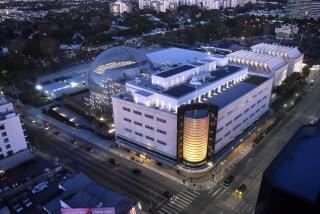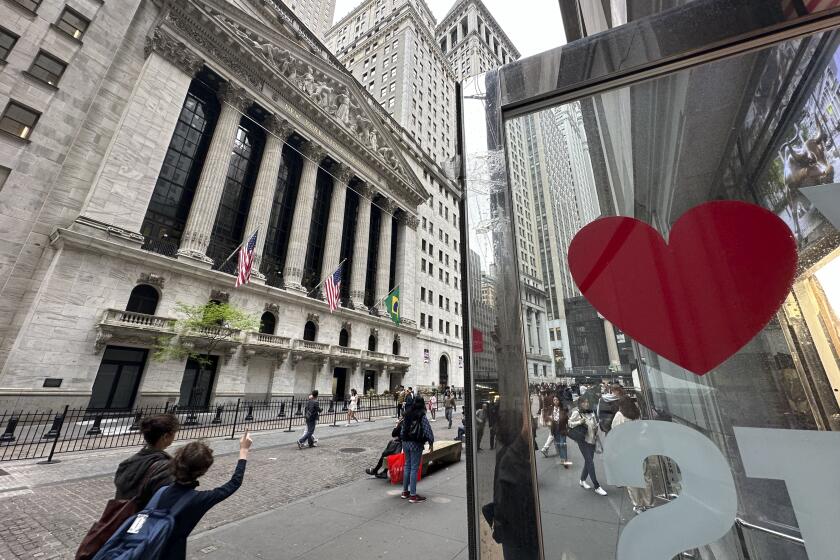Refrigerator door maker finds an entry into China
Strolling through the chilly aisles of a large grocery store here, Jeffrey Clark was warmed by the thought of all the potential new business awaiting his company.
“You see how cold it is in here?” asked Clark, president and chief executive of Anthony International, a Sylmar glassmaker specializing in doors for commercial refrigerators. Western-style supermarkets in China have been around for only a decade, and few have coverings for their coolers and freezers.
Customer comfort aside, he said, China’s focus on energy savings and product safety is likely to drive grocers to upgrade their cold-food displays.
“I feel like a kid in a candy shop,” said Clark, 52.
Clark’s company recently acquired Shanghai Flying Technical Glass Co., which makes a similar product but without Anthony International’s anti-fogging technology. The deal gives the Sylmar company a factory with 120 workers, a distribution chain and a base to build up sales in China and the rest of Asia.
The purchase of Flying Glass is Anthony International’s first push into China -- part of a trend of small and medium-size foreign companies expanding into the giant Asian country. Some U.S. firms are following their big multinational customers here, lest they lose that business to Chinese rivals. Others, such as Anthony, are investing to diversify and tap China’s market.
Relatively few U.S. businesses have made outright acquisitions of Chinese enterprises because joint ventures are often required or are easier to get done. But more are certain to come as U.S. companies work harder to break through Chinese barriers for mergers and acquisitions.
“China being the factory floor to the world is yesterday’s news,” said Donald Tang, vice chairman at Bear, Stearns & Co. and a prominent U.S.-China go-between based in Los Angeles. “Tomorrow’s headlines are, ‘China is the consumer to the world.’ ”
Privately held Anthony International has been around for 50 years and dominates commercial refrigerator glass sales in North America. Its international side, though, makes up just 15% of annual revenue, which Clark said was $170 million to $200 million. Clark hopes that the share of foreign sales will eventually rise to 40%, with China a big part of that.
He wouldn’t reveal the purchase price for Flying Glass but said it was six to eight times the Shanghai manufacturer’s earnings. Based on Flying Glass’ profit of about $400,000 this year, that would put the deal at $2.4 million to $3.2 million.
Clark doesn’t see Anthony’s move into China as a threat to jobs at home -- a perennial concern among U.S. manufacturing workers. On the contrary, if business in China grows, chances are that local employment will increase, said Clark, who started at Anthony as a sales manager 18 years ago.
Anthony employs about 850 people in Sylmar who earn an average $9.50 an hour. Flying Glass says its workers make about $270 a month, or roughly $1.70 an hour. Labor accounts for just 9% of Anthony’s total expenses. Far bigger costs are for energy and raw materials.
Anthony’s competitive edge is its technology. Clark says no company in China can match its metallic oxide coating and other applications that keep glass free from condensation and minimize transfer of heat in cooler cases, thus sharply cutting electricity costs. That’s the key reason Anthony’s sales have kept growing this year despite a 10% cutback in the number of orders because of the real estate and construction downturn. In the U.S., companies such as Target Corp. are paying more for Anthony’s newer, energy-efficient products.
Anthony has already begun to ship glass that comes out of its 1,300-degree ovens in Sylmar to Flying Glass, where it is cut and finished before delivery to Chinese grocery stores. Among Anthony’s newest customers through Flying Glass is the giant German chain Metro, which is installing glass doors at 27 stores in China -- an order worth roughly $800,000.
What’s not clear, however, is when this niche market in China will take off. By some industry estimates, total refrigerator door sales in China are no more than about $30 million annually. Commercial refrigerator makers in China generally have sold only one kind of refrigerator to supermarkets -- those without doors. No one knows when they’ll start changing this habit, said Zheng Liqing, Flying Glass’ general manager.
“Maybe it will take two years,” he said.
Sales at Flying Glass, including non-refrigerator products, are likely to exceed $4 million this year, said Zheng, 43, who with three friends launched the business in 1994 with about $10,000. In China, Flying Glass is known for making the 1-inch-thick glass for the observatory at Oriental Pearl Tower, Shanghai’s iconic structure that looks like a rocket or two big orbs on a stick.
Flying Glass also has ventured into Japan in recent years, giving Anthony International a base from which to extend sales throughout the Asia-Pacific region. Anthony’s 3,500 customers are in places as far-flung as Italy, South Africa and Australia.
Zheng said he and his partners agreed to sell to Anthony so Flying Glass would have stronger backing to grow and compete. Apparently the price wasn’t bad either.
“I’m satisfied,” said Zheng, who is staying on as the plant’s general manager.
Clark says Anthony has a thing or two to learn from Zheng, a Shanghai native and electronics engineer by training. “His quality control is superior to ours,” the American said.
Anthony International started its China project 2 1/2 years ago by hiring ALC Advisors, a Shanghai-based consulting and research firm. ALC identified 100 Chinese glass factories, and together they narrowed the list to 10 before beginning talks with Flying Glass two years ago.
Zheng flew out to visit the Sylmar operations; Clark made more than six trips to China, including a 12-hour flight just to sign a letter of intent. ALC and teams of expensive lawyers helped Anthony navigate the morass of Chinese rules and government approvals for mergers and acquisitions.
“You have to be patient,” Clark said. “That’s the thing I had a problem with. Money, energy and time were flowing out the door.”
At the end of it, Clark was all smiles. He arrived in China in early December to celebrate the acquisition. He was greeted by a column of dozens of blue-uniformed workers standing outside the Flying Glass factory in Shanghai’s industrial west. The street leading to the plant was freshly paved. There were mountains of flowers on display. Customers gave testimonials. Firecrackers popped for 20 minutes.
After an acquisition in the U.S., “everyone’s usually looking around to see if they’ll get canned,” Clark said. “Here, everyone’s looking hopeful.”







